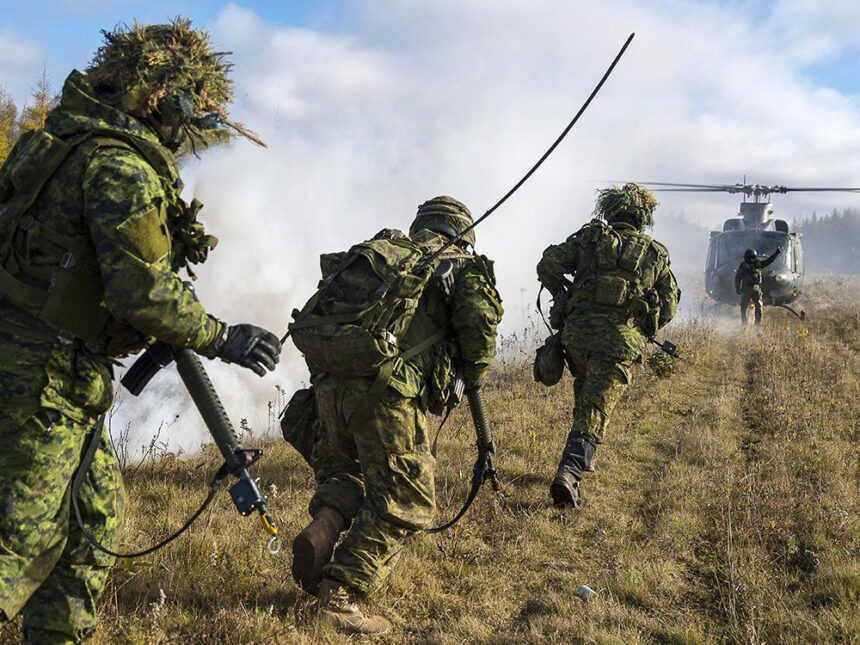Older Canadians show surprising willingness to defend their country if ever called upon, while younger generations appear less inclined to volunteer for military service. That’s the striking conclusion from a new Leger poll that reveals a generational divide in patriotic duty.
The survey found that about half of Canadians would volunteer to fight if Canada faced a military threat, but the numbers vary dramatically by age group. Nearly 59 percent of those aged 55 and older would take up arms, compared to just 41 percent of Canadians between 18 and 34 years old.
“There’s a profound shift in how different generations view national service,” explains Dr. Lauren McKenzie, political scientist at Carleton University. “Many older Canadians grew up with parents or grandparents who served in World War II, creating a stronger connection to military service that younger Canadians simply don’t have.”
The findings come amid growing global tensions and increasing concern about Canada’s military readiness. Last month, Defence Minister Bill Blair acknowledged that Canada’s armed forces face “significant challenges” in recruitment, with the military currently about 16,000 members short of full strength.
Jean-Marc Léger, president of Leger, noted the generational divide seems to reflect different perspectives on national identity. “Younger Canadians have grown up in a more globalized world. Their sense of obligation to the nation-state isn’t necessarily weaker, but it manifests differently than their parents’ or grandparents’ generation.”
The poll, which surveyed 1,622 Canadians in February, revealed other interesting patterns. Men were significantly more likely than women to say they would volunteer, with 61 percent of male respondents answering in the affirmative compared to 38 percent of women.
Regional differences also emerged. Atlantic Canadians showed the highest willingness to serve at 59 percent, while Quebecers were least likely at 42 percent.
“The Atlantic provinces have a deep military tradition,” notes retired Colonel Michael Dempsey, who served 32 years in the Canadian Armed Forces. “Communities like Halifax have been military towns for generations. That connection runs deep in the cultural fabric there.”
These results arrive as the Canadian Armed Forces struggles with both recruitment and retention. Last year, the military launched its “Serve with Strength” campaign aimed at attracting new recruits, particularly from underrepresented groups. However, progress has been slow.
“We’re competing for talent in a tight labour market,” admits Lieutenant-Commander Marie Clarkson, a CAF recruitment officer in Ottawa. “Young Canadians today have many career options that offer better work-life balance and competitive salaries.”
Beyond immediate recruitment concerns, the poll raises questions about Canada’s overall preparedness for global threats. A separate question in the survey found that 61 percent of Canadians believe the country would be unable to defend itself if attacked.
Community advocate Jagmeet Gill from Surrey, B.C., represents the younger demographic’s perspective. “My generation doesn’t see military service as the only way to serve our country. We’re focused on climate change, social justice, and community building. Those are battlegrounds too.”
Some experts suggest the findings reflect changing notions of citizenship rather than declining patriotism. “Young Canadians aren’t necessarily less patriotic,” argues Dr. Eliza Montgomery from the University of Toronto’s Munk School of Global Affairs. “They’re redefining what patriotism means in a digital, interconnected world where traditional borders seem less relevant.”
The poll also asked Canadians how they would respond if facing a military occupation. About 37 percent said they would engage in resistance activities, while 28 percent would try to flee the country. Only 12 percent said they would cooperate with occupying forces.
At Veterans Hall in Kingston, Ontario, 72-year-old retired sergeant William MacKenzie wasn’t surprised by the findings. “When I joined up in 1970, it was a different Canada. We had living connections to two world wars. Kids today don’t have that, and frankly, we should be grateful they haven’t had to experience what necessity feels like.”
Military recruitment challenges come amid growing security concerns from NATO allies about Canada’s defence spending, which remains below the alliance’s target of 2 percent of GDP despite recent increases.
The federal government has committed to increasing military spending, with Prime Minister Justin Trudeau announcing last year that Canada would invest billions in NORAD modernization and Arctic defence.
David Richardson, a 19-year-old university student in Calgary, represents the complex view many young Canadians hold. “I love this country deeply, but I’m not sure traditional military service is how I’d choose to show it. I’d volunteer for emergency response or community support roles first. That feels more aligned with my values.”
As global tensions rise and Canada reconsiders its military posture, these generational differences may prompt broader conversations about national service, citizenship responsibilities, and how patriotism is expressed in the 21st century.






